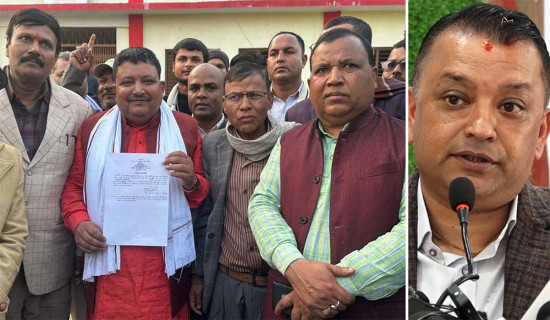- Wednesday, 21 January 2026
Recalling Forefathers
Vedic Sanatan is one of the oldest religions which has roots in paganism and even animalism. This means that the people who believe Vedic Sanatan Dharma believe that each and everything around them has life and existence. Therefore, they used to worship living and non-living things alike. They worshipped self, animals and plants. They deified even rivers and mountains as living entities while venerating the concepts of heaven, hell and gods of various types and demons as well.
Similarly, they consider that their dead ancestors reside in the heavens either with the gods or close to gods according to their deeds on the earth. So, those, who believe Vedic Sanatan religion, remember their dead ones for sixteen days prior to the start of great festivals - Dashain. Those sixteen days are called Sorha-Sharddha that commences from the day of full moon in the month of Asoja and ends on aunsi, last day of the dark half of the month. During this period, the majority of Vedic Sanatani people bathe early in the morning, wear clean clothes and eat fresh vegetarian foods.
So, from the humanistic point of view, remembering ancestors once in a year is wise deed in every respect for we are here today because of our ancestors. They must have worked hard to raise, care and educate us, as we are doing the same to our children. Therefore, they deserve due respect before we start to mark festivals. Epicureans believe that the cultural aspects play prominent role in shaping people's personality. If we listen to our seniors, saints and gurus, our level of understanding increases, making us mature, wise and practical.
A neighbour of mine was returning from Pashupati after offering Shraddha of his parents. When asked how he was feeling, he said, "I feel I am relieved”. As one pays tributes to their late parents, one must feel lightened and happy. Therefore, the practice of honouring ancestors should not be confined to a mere religious ritual, it is a deep respect for them. Conscious people must gather courage to overcome rigid barriers posed by a religion because it is not above scientific facts. Biologically, all human beings are the outcome of evolutionary process of life. We come from apelike ancestors. Anthropologically, human beings are social animals.
By birth, we have an inquisitive habit of imitating and learning from others. We learn from each other, share experiences and life-saving techniques. Therefore, it is not rational to bar any person from learning good practices of others. Knowingly or unknowingly, religions have both divided and united people from the very start of their origins. If the cultures, customs and traditions of other people are inspiring, we should not shy away from practicing them because they help us to be more advanced and civilised citizens.
If we continue to stick to old values considering them as a source of dignity, we will not progress ahead for many people are still in the grip ignorance. In Mahabharat, a great Hindu epic, Yakshya asks Udhisthir, “What has veiled this world?” Udhisthir, the eldest among Pandavas, replies: 'ignorance'.
















